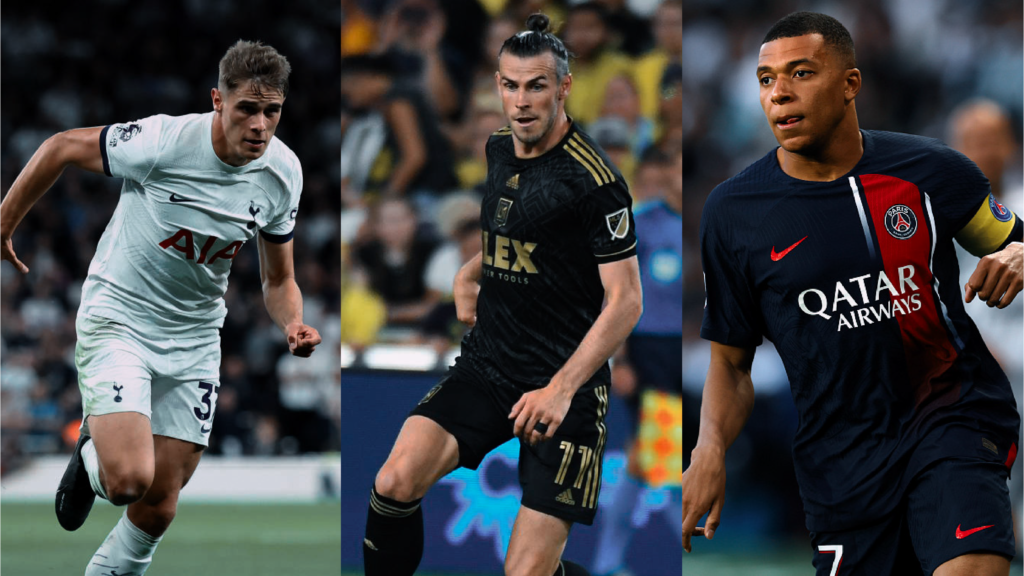the athletes who have become famous for their exceptional speed on the field. Football, or soccer as it’s known in some countries, is a sport that requires a blend of skills, including agility, strength, and speed. Speed is one of the most coveted attributes for a footballer, and being known as the fastest player in the world is a prestigious honor. In this article, we’ll explore who holds the title of the fastest footballer, how speed is measured in the sport, and what makes these players so unique.
Was bedeutet „Schnellster Fußballer der Welt“?
The term „Schnellster Fußballer der Welt“ refers to the footballer who has the highest top speed recorded during a match. Speed is crucial in football because it allows players to cover large distances quickly, escape defenders, create opportunities, and score goals. Many factors contribute to a player’s speed, including genetics, physical training, and the ability to accelerate and decelerate efficiently. The fastest footballers often stand out in matches, using their speed to outmaneuver opponents and dominate the field.
There are various ways to measure speed in football. Typically, top speed is calculated by tracking the maximum velocity a player reaches during a game. This can be done using advanced technology such as GPS trackers or by analyzing video footage. While the fastest footballers are known for their impressive sprinting abilities, their speed is not just about raw power. It’s also about how efficiently they can accelerate, change direction, and maintain speed over long distances.
The Top Contenders for „Schnellster Fußballer der Welt“
Over the years, many players have been recognized for their incredible speed on the football pitch. While records and rankings change over time, some names have consistently stood out in the discussion of the fastest footballers in the world.
1. Kylian Mbappé: The Speed King
Kylian Mbappé, the French forward who plays for Paris Saint-Germain (PSG), is often regarded as the fastest footballer in the world today. Mbappé’s acceleration and top speed have left defenders in the dust in many high-profile matches. His ability to reach a top speed of 38 km/h (about 23.6 mph) makes him a formidable force on the field. What sets Mbappé apart is not just his top speed, but also his quick acceleration, which allows him to blow past defenders even before they can react.
Mbappé’s speed has made him a major asset for both his club and the French national team. His performance in the 2018 World Cup, where he helped France win the tournament, was a testament to his blazing pace, and it solidified his place as one of the fastest footballers in history. As a result, he is often labeled as „Schnellster Fußballer der Welt“ by fans and experts alike.

2. Achraf Hakimi: The Moroccan Rocket
Achraf Hakimi, a Moroccan footballer who plays for Paris Saint-Germain (PSG) and the Moroccan national team, is another player known for his incredible speed. Hakimi’s top speed is recorded at 36.48 km/h (about 22.7 mph), making him one of the fastest footballers in the world. What’s remarkable about Hakimi is not just his speed, but his stamina and his ability to maintain high speeds for long distances.
He plays as a right-back or wing-back, positions that require immense running ability. Hakimi has used his speed to great effect in both club and international football, contributing significantly to his team’s offensive and defensive strategies. His lightning-quick sprints and ability to cover vast areas of the field have made him a standout player for PSG and Morocco.
3. Alphonso Davies: The Canadian Speedster
Alphonso Davies, who plays for Bayern Munich and the Canadian national team, is widely recognized for his exceptional pace. Davies is capable of reaching a top speed of 36.51 km/h (about 22.7 mph), making him one of the fastest players in Europe. His speed is particularly evident when he is making overlapping runs from the left-back position, where he often races past opponents to deliver crosses or join the attack.
Davies gained international fame during the 2020 Champions League, where he made a stunning run to set up a goal against Barcelona, leaving defenders in his wake. His speed, combined with his excellent ball control and vision, has made him a key player for both Bayern Munich and the Canadian national team.
4. Usain Bolt: The Footballing Experiment
Although not a professional footballer, Usain Bolt, the world’s fastest man, has also dabbled in football. Bolt, known for his record-breaking performances in the 100m and 200m sprints, briefly tried to transition into football after retiring from athletics. Though his football career didn’t take off, his speed remains legendary, and if he had pursued football seriously, he would have undoubtedly been one of the fastest footballers of all time.
While Bolt’s football journey didn’t last long, his mere presence in the sport highlighted the importance of speed in football and how a top athlete’s sprinting ability can influence the game. Bolt’s speed remains unmatched in athletics, and his foray into football only added to the intrigue surrounding speed in the sport.
Wie wird die Geschwindigkeit im Fußball gemessen?
The measurement of a footballer’s speed is not as simple as timing a sprint. It involves using technology that tracks a player’s movement throughout a match. GPS trackers are often worn by players, allowing coaches and analysts to monitor their running speed, distance covered, and acceleration. These trackers provide precise data on a player’s performance during a game.
Another way to measure speed is through video analysis, where experts analyze a player’s top speed by reviewing footage from matches. This method helps assess the player’s performance in specific situations, such as when they are chasing down a ball or sprinting to make a tackle.
It’s important to note that a player’s speed is not just about running fast in a straight line. Footballers are often required to sprint short distances, change direction rapidly, and maintain their speed despite physical fatigue. This is why acceleration, agility, and stamina are just as important as raw speed in football.
The Importance of Speed in Modern Football
Speed is a crucial component of modern football. Today’s game is faster than ever before, and teams rely heavily on players who can move quickly across the field. Whether it’s a counter-attack, a last-minute goal, or tracking back to defend, speed is often the difference-maker. Football clubs and national teams increasingly value players who possess not only exceptional technical skills but also the ability to outpace their opponents.
In attacking situations, speed allows players to exploit spaces in the defense, creating opportunities for goals. Fast wingers and strikers can take advantage of long balls, get behind defenders, and create chances in tight spaces. In defense, quick players can intercept passes, close down opponents, and block shots before they develop into dangerous situations.
Speed vs. Other Attributes in Football
While speed is undoubtedly important, it’s not the only factor that contributes to a successful football career. Technical skills, such as dribbling, passing, and shooting, are also vital. Footballers need to have a balance of attributes, and while speed can give them an edge, it’s not always enough on its own. Players like Lionel Messi and Cristiano Ronaldo have excelled not only because of their speed but because of their technical prowess, intelligence, and vision on the field.
However, when combined with other skills, speed becomes an even more potent weapon. Fast players who can dribble, pass, and shoot with precision become some of the most dangerous in the world. This combination of speed and technique is why players like Mbappé, Hakimi, and Davies are so highly regarded.

Die Zukunft der schnellsten Fußballer
Looking to the future, the quest for the „Schnellster Fußballer der Welt“ is unlikely to slow down. As football becomes faster and more athletic, players will continue to push the boundaries of what’s possible. New training techniques, better nutrition, and advanced technology will help players improve their speed and overall performance.
Coaches are also recognizing the importance of speed in all positions, from defenders to midfielders. The next generation of footballers will likely see even faster players, continuing the trend of speed being a key factor in determining success on the pitch.
Fazit: Die schnellsten Fußballer sind auch die gefährlichsten
In conclusion, being the „Schnellster Fußballer der Welt“ is no easy feat. It requires a combination of natural talent, rigorous training, and smart tactics. The players mentioned above—Kylian Mbappé, Achraf Hakimi, Alphonso Davies—are just a few examples of the speedsters who have revolutionized modern football. As the game continues to evolve, speed will undoubtedly remain one of the most important attributes for players at all levels. For fans and experts alike, the fastest footballers will continue to capture attention and admiration for their incredible feats of speed and athleticism.


